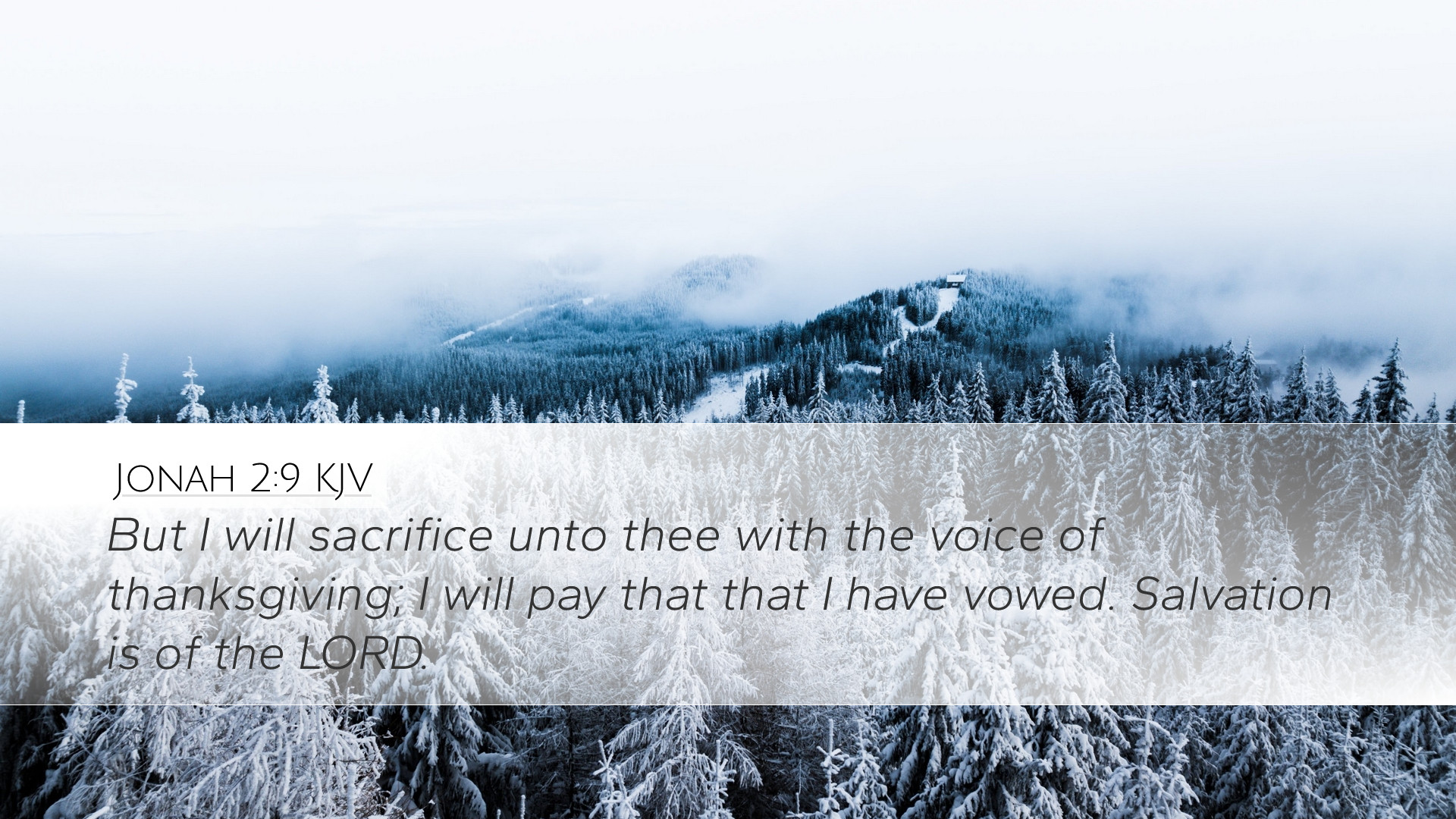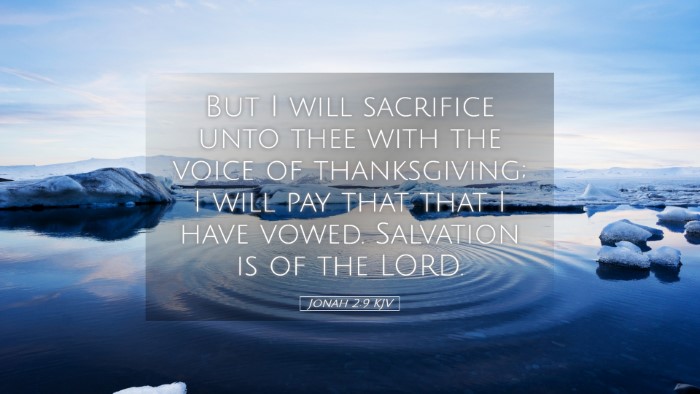Old Testament
Genesis Exodus Leviticus Numbers Deuteronomy Joshua Judges Ruth 1 Samuel 2 Samuel 1 Kings 2 Kings 1 Chronicles 2 Chronicles Ezra Nehemiah Esther Job Psalms Proverbs Ecclesiastes Song of Solomon Isaiah Jeremiah Lamentations Ezekiel Daniel Hosea Joel Amos Obadiah Jonah Micah Nahum Habakkuk Zephaniah Haggai Zechariah MalachiJonah 2:9
Jonah 2:9 KJV
But I will sacrifice unto thee with the voice of thanksgiving; I will pay that that I have vowed. Salvation is of the LORD.
Jonah 2:9 Bible Commentary
Commentary on Jonah 2:9
Jonah 2:9 (ESV): "But I with the voice of thanksgiving will sacrifice to you; what I have vowed I will pay. Salvation belongs to the LORD!"
This short verse encapsulates profound themes of gratitude, dedication, and the sovereignty of God, all woven into Jonah's prayer from the belly of the fish. Various public domain commentaries shed light on the richness of these themes.
Overview and Context
The Book of Jonah is unique among the prophetic books in that it emphasizes God's mercy and grace, not just towards Israel but towards all nations. Jonah’s distress, encapsulated in chapter 2, places him at a critical moment of realization and repentance. It's essential to understand that Jonah's prayer arises from a place of deep suffering and isolation, likely a metaphor for his spiritual condition prior to this miraculous deliverance.
The Voice of Thanksgiving
Matthew Henry notes that the expression "with the voice of thanksgiving" signifies Jonah’s acknowledgment of God’s mercy and power. He highlights that true thanksgiving often arises from intense trials. Jonah proclaims gratitude not from a place of comfort but from within the depths of despair, which underlines the legitimacy and depth of his praise. This teaches pastors and theologians about the importance of giving thanks in all circumstances, as noted in 1 Thessalonians 5:18.
Life Application
For believers, this verse serves as a reminder that our voices should remain filled with gratitude even in the depths of life's challenges. The exercise of thanksgiving should not solely be reserved for times of blessing but should be cultivated as an ongoing dialogue with God. Pastors can encourage their congregations to develop a lifestyle of gratitude reflective of Jonah's experience.
The Sacrifice of Thanksgiving
Albert Barnes elaborates on the term "sacrifice" as a profound action of devotion. The notion of sacrifice represents not merely an external act but also signifies an internal commitment to God. Jonah acknowledges his obligation to fulfill his vows—a concept that is rich in biblical tradition. This includes the idea of dedicating oneself and one's actions to God above personal desires.
Theological Reflections
- Covenantal Faithfulness: The call to fulfill one's vows reflects the covenantal framework within which Israel operated. It denotes the seriousness of promises made before God.
- Spiritual Growth through Adversity: Adam Clarke emphasizes that moments of distress often lead to deeper commitments and reconnect believers with their purpose. Jonah's ordeal fosters a renewed sense of dedication.
What I Have Vowed I Will Pay
This phrase marks a pivotal point in Jonah's spiritual journey. His acknowledgment of his previous commitments indicates not only repentance but also a pivot towards obedience. Here, we see a transformation; Jonah shifts from rebellion to a recognition of his role as a prophet.
Pastoral Insight
For pastors and teachers, this part of the verse can become a teaching point about integrity in one’s walk with God. The call to honor one’s commitments is a foundational aspect of Christian discipleship. Such discussions about the nature of our vows can help congregants reflect on their own faith journeys and obligations.
Salvation Belongs to the LORD
In this declaration, Jonah identifies God's sovereignty over salvation. Adam Clarke explains that this statement reaffirms God as the ultimate source of deliverance, thus positioning Jonah's experience within the larger narrative of God’s saving work throughout scripture.
The Sovereignty of God
Theologically, the acknowledgment that "salvation belongs to the LORD" serves as a foundational principle for understanding the Grace of God. It can be a profound teaching moment for students of theology, emphasizing that salvation is not earned, but freely given by God.
- Inclusivity of God's Grace: Barnes notes that God’s grace is not limited, highlighting Jonah’s role as a prophet who must learn that God’s mercy extends beyond Israel.
- Hope in Despair: This statement provides hope, indicating that no matter the dire circumstances, God is still in control and capable of redemption.
Conclusion
Jonah 2:9 serves as a rich theological tapestry that weaves together themes of thanksgiving, fulfillment of vows, and divine sovereignty. For pastors, students, and theologians, it prompts profound reflection on the nature of gratitude amidst trials and the call to recognize God's place as sovereign over all aspects of salvation.
This verse remains timeless, inviting introspection about our commitments to God, the nature of our thanksgiving, and our understanding of divine grace. In practical terms, it encourages believers to maintain a voice of thankfulness in every situation and embrace their roles and responsibilities in their walk of faith.


